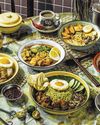
The expressway from Shenzhen to Dongguan and Guangzhou, through one of China's industrial heartlands, boasts almost every vehicle the global market has to offer. Toyota sedans weave aggressively between industrial tankers; sleek Maybachs and Mercedes-Benzes ferry executives; Teslas silently demand attention; and global staples like the Volkswagen Golf chug along, minding their own business.
But they are only half the fleet. Every second car seems to have an unfamiliar nameplate, funky headlights and a whining electric motor. These are the new Chinese automobiles. They are taking over their domestic market. Soon, they will take over the world.
The rise of Chinese cars in China is already claiming victims abroad: Volkswagen plans to close factories in Germany for the first time and lay off tens of thousands of workers as it loses share in the world's biggest auto market. But this is just the beginning.
Established carmakers are vowing to cut costs, begging for subsidies, demanding tariffs which the EU has just enacted and trying to cling to the internal combustion engine.
If the intention is to preserve industrial employment, then these efforts are doomed to fail. That is because the shock is not just China or just electric vehicles (EVs). It is both at once.
This story is from the November 04, 2024 edition of The Straits Times.
Start your 7-day Magzter GOLD free trial to access thousands of curated premium stories, and 9,000+ magazines and newspapers.
Already a subscriber ? Sign In
This story is from the November 04, 2024 edition of The Straits Times.
Start your 7-day Magzter GOLD free trial to access thousands of curated premium stories, and 9,000+ magazines and newspapers.
Already a subscriber? Sign In

Japan's True Blue Tradition
Call it an antidote to fast fashion. Japanese jeans hand-dyed with natural indigo and weaved on a clackety vintage loom, then sold at a premium to global denim connoisseurs.
6 easy dishes to pack for lunch
Nutritionists and food content creators suggest these healthy and convenient recipes

Don't cross Culinary Class Wars star Anh Sung-jae of three-Michelin-starred Mosu
On an early episode of Netflix's hit reality cooking show Culinary Class Wars (2024), chef Anh Sung-jae stood in a warehouse filled with makeshift cooking stations and considered the plate in front of him: a rainbow palette of handmade pastas, purees and delicately cooked seafood. On top was a smattering of flower petals.

Emerald Hill to make Netflix debut
Emerald Hill looks set to be the must-watch local blockbuster series of 2025.

Refreshed museums in SG60 arts
A timely slate of refreshed spaces and new programmes at Singapore's arts and cultural institutions will be launched in 2025, wooing audiences with a different Singapore story as the nation gears up to mark 60 years of independence.

Going casual to woo fickle diners
Serious artwork on the wall. Bespoke crockery on cloth-covered tables. A fine wine list. Eye-watering menu prices. Just don't call it a fine-dining restaurant.

Smartwatches Make Healthcare Smarter
From tracking heart rate to steps taken to sleep quality, smartwatches and fitness trackers can generate biometric data about the people using them.

Quality, not quantity, rules the superhero game
In 2025, the big studios are rolling up their sleeves to tackle a disease plaguing the box office – superhero fatigue.

Big-name musicals to hit the stage
Soothing melodies and soaring high notes are set to fill the air, as the coming year brings along a host of musicals to the Lion City.

Celebrating design with SG60, new hotels and theme parks
Architecture and urban design take centre stage in 2025, with marquee events such as a year-long celebration of Singapore's 60th year of independence (SG60) and launches of Sentosa attractions to enhance the destination's \"islander allure\".